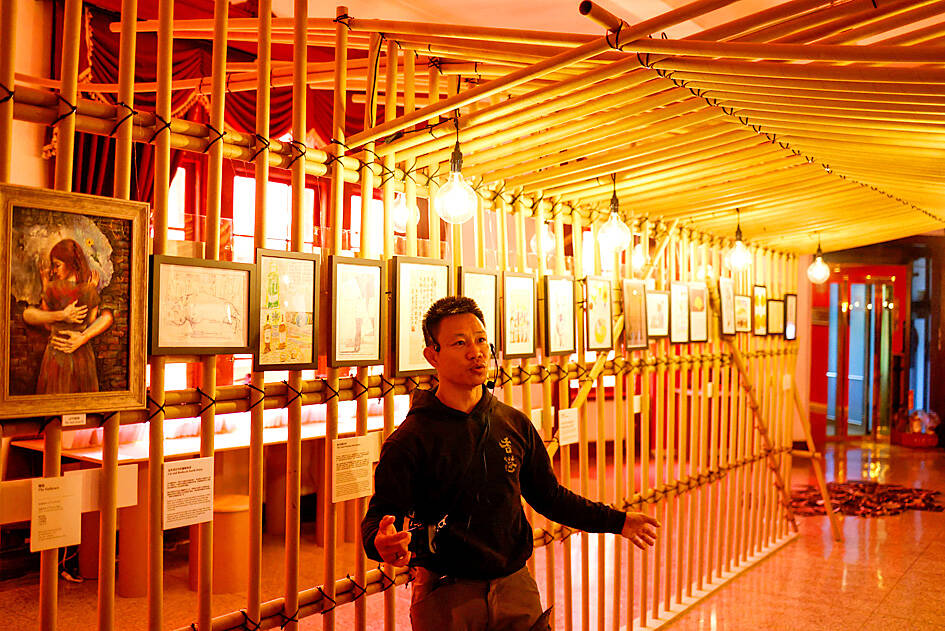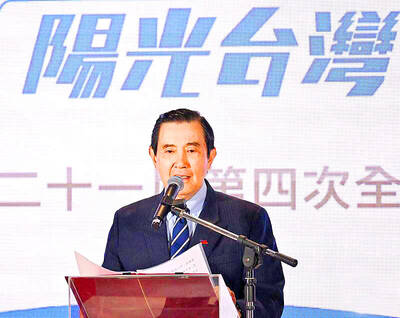Fu Tong (湯偉雄) and his wife, Elaine To (杜依蘭), were among the first demonstrators in Hong Kong to be charged with rioting in 2020, after pro-democracy and anti-China protests started in 2019.
After leaving for Taiwan, Fu continued his activism and is now preparing to mark the anniversary of Beijing’s bloody crackdown on protesters in and around Tiananmen Square on June 4, 1989.
Fu has cohosted a Hong Kong human rights exhibition in Taipei, showcasing artwork from the protest movement, and leads guided tours of the displays.

Photo: Ann Wang, Reuters
“When Hong Kong can no longer hold the June 4 vigils, and can no longer even mention it, Taiwan’s existence becomes very important,” 43-year-old Fu said.
“It’s one of the very few places in Asia where people can openly commemorate the incident on June 4, discuss it and even condemn the Chinese Communist Party [CCP]. The existence of such a space is already hugely significant,” he said.
Taiwan is the only part of the Chinese-speaking world where June 4 can be remembered openly, although Chinese communities in the US, the UK, Australia and other Western countries also mark it.
In Hong Kong, a national security law has outlawed such events, which previously drew tens of thousands of people.
Fu said he remains committed to advocating for Hong Kong’s issues and the values of freedom.
“I really feel like I have been chosen to be in this era. If I do not step up to do things that seem foolish and unrewarding, then who will? As long as I can, I am willing to keep going,” he said.
Before dawn on June 4, 1989, Chinese tanks rolled into Tiananmen Square, crushing weeks of pro-democracy demonstrations by students and workers.
China has never provided a full death toll, but rights groups and witnesses say the figure could run into thousands. Public discussion of what happened is taboo in China, which blamed the protests on counter-revolutionaries seeking to overthrow the CCP.

A fourth public debate was held today about restarting the recently decommissioned Ma-anshan Nuclear Power Plant, ahead of a referendum on the controversial issue to be held in less than two weeks. A referendum on Aug. 23 is to ask voters if they agree that “the Ma-anshan Nuclear Power Plant should continue operations upon approval by the competent authority and confirmation that there are no safety concerns.” Anyone over 18 years of age can vote in the referendum. The vote comes just three months after its final reactor shut down, officially making Taiwan nuclear-free. Taiwan People’s Party Chairman Huang Kuo-chang (黃國昌) represented

ENDORSING TAIWAN: Honduran presidential candidate Nasry Afura said that Honduras was ‘100 times better off’ when it was allied with Taipei The Ministry of Foreign Affairs yesterday said it would explore the possibility of restoring diplomatic relations with Honduras based on the principle of maintaining national interests and dignity. The ministry made the remarks in response to reporters’ questions regarding an article titled: “Will Taiwan Regain a Diplomatic Ally?” published in The Diplomat on Saturday. The article said Honduras’ presidential election in November could offer Taiwan the chance to regain an ally, as multiple candidates have promoted re-establishing diplomatic relations with Taiwan. Honduras severed diplomatic ties with Taiwan in March 2023 in favor of Beijing, but since switching its diplomatic recognition,

Scoot announced yesterday that starting in October, it would increase flights between Taipei and Japan’s Narita airport and Hokkaido, and between Singapore and Taipei. The low-cost airline, a subsidiary of Singapore Airlines, also said it would launch flights to Chiang Rai in Thailand, Okinawa and Tokyo’s Haneda airport between December and March next year. Flights between Singapore and Chiang Rai would begin on Jan. 1, with five flights per week operated by an Embraer E190-E2 aircraft, Scoot said. Flights between Singapore and Okinawa would begin on Dec. 15, with three flights per week operated by Airbus A320 aircraft, the airline said. Services between Singapore

‘ANGRY’: Forgetting the humiliations and sacrifices of ‘the people of the Republic of China’ experienced disqualified Lai from being president, Ma Ying-jeou said Former president Ma Ying-jeou (馬英九) yesterday criticized President William Lai (賴清德) over what he called “phrasing that downplayed Japan’s atrocities” against China during World War II. Ma made the remarks in a post on Facebook on the 80th anniversary of the end of World War II. Ma said he was “angry and disappointed” that Lai described the anniversary as the end of World War II instead of a “victory in the war of resistance” — a reference to the end of the Second Sino-Japanese War (1937-1945). The eight-year war was a part of World War II, in which Japan and the other Axis